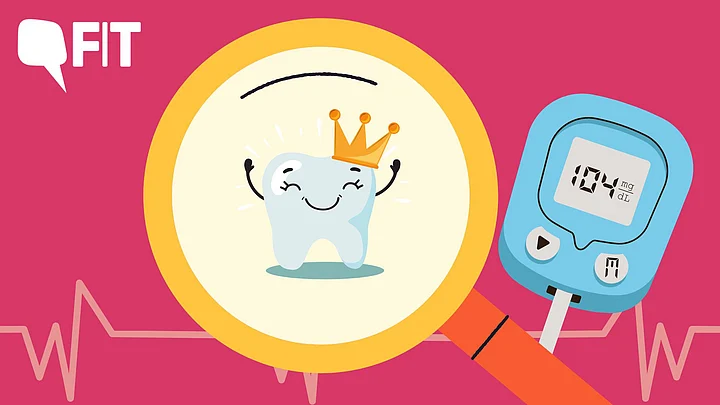Dental check-ups are a must, more so if you have diabetes. From visiting a dentist every 6 to 12 months to following a proper dental hygiene routine, attention to your oral health is of utmost importance.
To understand its association with dental health and more, we spoke to Dr Ninad Muley Consultant Prosthodontics, Apollo Hospitals Navi Mumbai, and Dr Aditi Upadhyay, Dental Surgeon, Max Hospital, Panchsheel.
How does diabetes affect dental health?
A person with diabetes has higher chances of oral health problems as it can reduce the blood supply to the dental region.
When a person is diabetic, the maintenance and care of their dental health becomes even more important as having high blood sugar may exhaust and weaken white blood cells.
This could be a serious problem as the white blood cells help our bodies fight infections that can occur in the mouth.
Having a good oral health routine overall can help in avoiding infections caused due to tooth and gum disease.
What are the most common mouth problems faced because of diabetes ?
The most common mouth problems associated with diabetes include:
● Gum disease (periodontitis): Diabetes affects the body's ability to fight off infection, including gum infections. This can cause inflammation and damage to the gums, leading to periodontitis. Symptoms include red, swollen, and bleeding gums, as well as bad breath.
● Thrush: This is a fungal infection that can occur in the mouth and tongue. People with diabetes are more prone to thrush because high blood sugar levels can create an environment that is conducive to fungal growth.
● Dry mouth (xerostomia): High blood sugar levels can also cause dry mouth, which can lead to a range of problems such as bad breath, tooth decay, and gum disease.
What is the link between diabetes and gum disease?
Periodontal disease, also known as gum disease, is a very is commonly witnessed problem in a diabetic patient.
It is caused by an infection that destroys the bone that surrounds and supports your teeth. Dr Upadhyay says that this bone also holds your teeth into your jawbone, and allows you to chew your food comfortably.
"The bacteria and food debris called dental plaque is a major contributor to gum disease, that can dig deep into different parts of your mouth and the bones that guard it," Dr Upadhyay added.
This needs serious attention as it can have and severely affect the bone and tissues supporting your teeth and there are chances of losing your teeth.
What are the symptoms of gum diseases and when should you see a doctor?
Please see your dentist immediately if you notice any signs and symptoms of gum disease such as:
Red, swollen, tender, bleeding gums
Persistent discharge (pus) coming from the gums
Gums that are loose and pull away from the teeth
Bad taste or bad breath
Loose teeth. This can change the ‘feel’ of your bite when your teeth are placed together or may make dentures fit differently
Spaces opening up between your teeth.
Why do dentists ask their patients if they’re diabetic or not? How does diabetes affect any form of dental treatment?
According to Dr Ninad Muley, dentists ask their patients if they have diabetes because it is a systemic condition that can affect their dental health and the success of dental treatment.
Dr Muley says, "Diabetes is a chronic metabolic disorder that affects the body's ability to process glucose or sugar and high blood sugar levels can weaken the immune system, increasing the risk of infections, including gum disease."
People with diabetes are also more likely to experience dry mouth, which can lead to tooth decay and other dental problems.
"In terms of dental treatment, diabetes can affect the healing process and increase the risk of complications. For example, if a person with diabetes needs a tooth extraction or oral surgery, their healing may be slower, and they may be more prone to infection. Dentists may need to adjust their treatment plan or prescribe antibiotics to prevent or manage infection."
Therefore, by knowing if their patients have diabetes, dentists can better assess their dental health and develop a personalised treatment plan that takes their diabetes status into account. It is essential for people with diabetes to inform their dentists about their condition and to manage their blood sugar levels to maintain good oral health.
What should a person do if they have mouth problems from diabetes?
"If you have mouth problems from diabetes, it is important to do deep cleaning or periodontal therapy to manage gum disease," says Dr Muley.
If you have thrush, you may be prescribed with an antifungal medication. If you have dry mouth, your dentist may recommend products such as artificial saliva or mouth rinses to help keep your mouth moist. It is also important to maintain good oral hygiene at home, including brushing twice a day and flossing daily. Managing your blood sugar levels through diet, exercise, and medication can also help improve your oral health.
Periodontal therapy is nowadays done with the latest technology of lasers, which is pain free and comfortable procedure.

